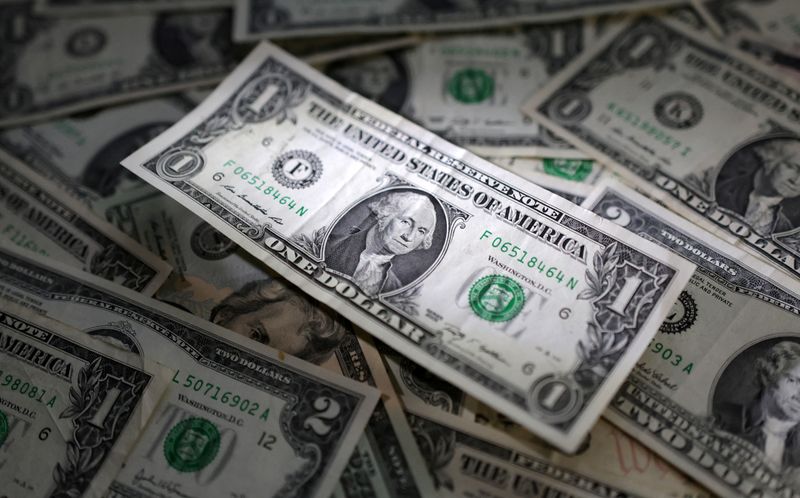
By Stefano Rebaudo and Wayne Cole
(Reuters) -The euro dropped on Monday versus a strengthening U.S. greenback on rising considerations a couple of potential authorities collapse in France, which might stall plans to curb a burgeoning price range deficit.
The chance premium traders demand to carry French debt reasonably than benchmark German bonds jumped after France’s far-right Nationwide Rally (RN) president Jordan Bardella stated his social gathering would seemingly again a no-confidence movement within the coming days until there have been a “final minute miracle”.
Main RN lawmaker Marine Le Pen has given Prime Minister Michel Barnier till Monday to satisfy her social gathering’s price range calls for.
The euro fell 0.65% to $1.0506.
“French politics seems to be to be belatedly enjoying a job in foreign exchange and driving some euro underperformance,” stated Chris Turner, head of foreign exchange technique at ING.
Most analysts nonetheless reckoned that Le Pen did not need to deliver down the federal government as she might be blamed for a monetary and financial disaster in France.
“But it seems to be just like the stress might keep on the euro with a possible no-confidence vote approaching Wednesday,” added Turner, after flagging that ING economists suppose RN wouldn’t make the federal government collapse.
The yield unfold between French and – a gauge of the premium traders demand to carry French debt – rose 5 foundation factors (bps) to 85 bps after hitting 90 bps final week, its highest stage since 2012, in the course of the euro space’s sovereign debt disaster.
The U.S. greenback rose as President-elect Donald Trump marked a shift from his prior advocacy of a weaker greenback by demanding that BRICS member international locations decide to not creating a brand new foreign money or supporting one other foreign money that might substitute the greenback or face 100% tariffs.
The – a measure of its worth towards the principle currencies — rose 0.6% to 106.39.
It recorded on Friday its first weekly fall since September 2023 because the so-called Trump commerce light.
The rapidly slipped to a 4-1/2-month low at 7.2856 per greenback
“Given the continued resilience of the U.S. financial system and a worsening outlook elsewhere, we do not suppose that is the beginning of a deeper setback for the greenback,” stated Jonas Goltermann, deputy chief markets economist at Capital Economics.
“However the bar for an extra shift in anticipated rates of interest in favour of the U.S. within the close to time period is kind of excessive,” he added. “A interval of consolidation into year-end seems to be to us just like the almost definitely situation, though the dangers stay skewed in favour of the greenback over the course of 2025.”
Key to the outlook for charges would be the November payrolls report due Friday the place median forecasts favour an increase of 195,000 following October’s climate and strike-hit report, which may be revised given a low response fee for that survey.
The jobless fee is seen edging as much as 4.2%, from 4.1%, which ought to maintain the Federal Reserve on track to chop by 25 foundation factors on Dec. 18.
Markets suggest a 65% likelihood of such an easing, although additionally they solely have two extra cuts priced in for all of 2025.
A bunch of Fed officers are attributable to communicate this week, together with Fed Chair Jerome Powell on Wednesday, whereas different information embody surveys of producing and companies.
YEN PARES GAINS
The greenback regained 0.3% on the yen to 150.18, having shed 3.3% final week in its worst run since July. Assist lies round 149.47 with resistance at 151.53.
Over the weekend, Financial institution of Japan Governor Kazuo Ueda stated the subsequent rate of interest hikes are “nearing within the sense that financial information are on monitor”, following figures exhibiting Tokyo inflation picked up in October.
Knowledge out Monday confirmed enterprise funding operating at a wholesome 8.1% clip within the third quarter, encouraging markets to cost in a 63% likelihood the BOJ will hike by 1 / 4 level to 0.5% at its coverage assembly on Dec. 18-19.

Barclays (LON:) economist Christian Keller stated information on labour earnings this week ought to present an extra pick-up and all of the indicators had been pointing to a different robust “shunto” wage spherical in February.
“The wage and inflation image continues to help additional fee hikes, although whether or not the BOJ strikes in December or January stays an in depth name,” he added.